#captive killer whale
Explore tagged Tumblr posts
Photo
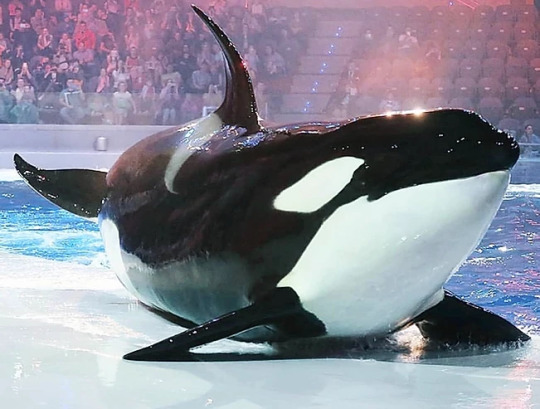
Narnia, has died at Moskvarium (est. 17 years old). The cause of death was intestinal volvulus. The press release does not issue the date of death, but its presumed to have occurred in January 2023. More details will be posted if they are released. Narnia was captured on August 11, 2012 in Reyneke Bay, Sea of Okhotsk, Russia.
(translated, Russian) "Narnia passed away at the age of 17, she was the oldest representative of the Moskvarium killer whale family. Until the last day, there were no signs of illness or illness in the behavior and medical records of Narnia. The cause of death was established after a study, the results of which were received a few days later - Narnia died of acute intestinal volvulus. Unfortunately, toothed whales, including killer whales, are very often affected by this pathology. This pathology is described both in wild killer whales and dolphins, and in animals living in artificial conditions. The departure of Narnia is an irreparable loss for the entire Moskvarium team."
Via Cetabase
8 notes
·
View notes
Note
When horses end up with severe leg/hip injuries, they are almost always put to sleep. The odds of recovering full mobility from such injuries are slim and the odds of reinjury are high, so even if the horse is perfectly healthy in all other aspects, it is generally recognized to be more humane to put them down than to keep them alive just to live the rest of their lives limping around a small paddock or stall. A life for a horse in which s/he cannot gallop, leap, explore and play is no life at all. Why not apply the same logic to cetaceans? A life for a cetacean in which they can’t dive hundreds of meters, make meaningful autonomous choices (“should I play with the rubber ball or the puzzle feeder today?” is not a meaningful choice; research has shown that autonomy is crucial for animal welfare), echolocate and experience the rich biodiversity of the ocean is no life. I really don’t understand why it’s so horrible to think it more humane to euthanize a confused and sick orca calf if there is no chance of rehab and release than to take her/him permanently into captivity. It’s not disparaging or hateful to cetacean trainers to say so—I know they care about animals—it’s simply a logical ethical stance. Instead of searching in vain for orca conservation organizations that aren’t “radically anti-captivity”, maybe pro-caps should look inwards and ask themselves why all the major orca organizations (Center for Whale Research, Orca Behavior Institute, OrcaLab, Wild Orca, Orca Conservancy, Far East Russia Orca Project, etc.) as well as some cetacean organizations (ex. Whale and Dolphin Conservation, Cetacean Society International) oppose captivity. Is it because all of these esteemed groups, which if you look them up are all staffed by credentialed scientists, have been duped by the “animal rights agenda”, or could it be because maybe, just maybe, they know what they’re talking about? If captive orcas are so different from wild ones that wild orca biologists have no credibility to speak about their welfare, then that’s a clear indictment of captivity already.
Hi. I'm sorry for not answering right away, I was still at my externship when I got your ask, and I wanted to be able to sit down and give you a proper answer. So unfortunately, I don't think what I say will satisfy you. I don't expect to change your mind, nor is that my goal here. I only want to explain why I believe the way I do, so that you or others reading this can at least understand that it's not a position I take lightly, nor do I think it's infallible.
(Long post below the cut):
To start off, as an (almost) veterinarian, there are absolutely plenty of circumstances where I find euthanasia to be the correct decision. Euthanasia is our final gift to our patients, a swift and painless death in the face of prolonged suffering or poor quality of life. A large dog with debilitating osteoarthritis. A cat with terminal lymphoma. A down cow. A raptor with an amputated leg. Or like you mentioned, a horse with a fractured hip. These animals would live in a constant state of pain that they don't understand, and death can rightly be considered a kindness to them.
But an otherwise healthy orca calf? I would consider that a false equivalence. I agree that life in the wild should be prioritized whenever possible, and that captive orcas lead very different lives than their wild counterparts. But if that orca cannot return to the wild (orphaned and unable to be reunited with its pod, habituated to humans, non-painful disability such as deafness), and there is a facility willing to take it on, I do not think euthanasia is an appropriate option. In human care, that calf can still swim, breach, and dive, even if not to the same depths as the ocean (it's also worth noting that these are all costly behavior energetically and are not performed for no reason). It can still socialize and form family bonds with an adopted pod of whales. It can still (theoretically) mate and rear calves. It can still engage its big brain in problem-solving through training and enrichment in the place of hunting. And as a bonus, it will never go hungry and has access to veterinary care if ill or injured.
This is not a wild life. This is not the same life they would've, or should've known. A pool, no matter how well-appointed, is not the ocean, and we should not claim they're comparable. But I don't think it's a fate worse than death. I truly don't. But if it is... if freedom really is worth more than life, then all captive whales need to be euthanized. Even in a sea pen setting, they will not be free. They will not choose their food, their companions, their enrichment, their comings and goings. Those choices will still be made on their behalf by caregivers, and they will still have pretty much the same levels of autonomy as in their tank habitat. They will still be captive. (While some people do advocate for this, I don't think it's a popular outlook. Even SOS Dolfijn, a historically anti-cap organization, recently announced plans to build an aqauarium as a permanent home for non-releasable cetaceans rather than continuing to euthanize them).
Speaking of autonomy, yes, it is very important. But I truly don't think the orcas are distressed by the lack of meaning in choosing between enrichment devices. I think that's why we disagree on this topic... we have different worldviews. We both see orcas as beautiful, intelligent creatures, but I do not see them as people. They are animals, and for all their complexity, I interpret their behavior the same way I do any other species... they are motivated by food, reproduction, and (since they're highly social) companionship. Because of that, I still think we can give them a good life in human care, which is why it frustrates me to see the zoo community throw up their hands and give up rather than trying to improve our current less-than-ideal setups (*shakes my fist at the Blue World project*).
Now, I don't think it's wrong to be emotional about animals. I most definitely am! And it's very clear to me you love orcas and care about their wellbeing deeply. I admire that about you, and I appreciate your passion.
On to the next point... in the cetacean world, I've found that there is an unfortunate divide between researchers and caregivers who work with cetaceans in human care and those who study them exclusively in the wild. And that schism far predates the Blackfish era. Most of those organizations you listed are indeed legitimate, and I fully support their vital work and encourage others to do the same. A few of them, though, share things like this:
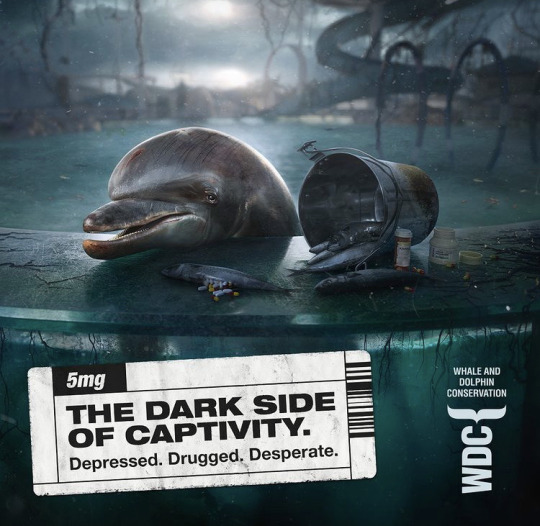
I think you can understand why this hurts me. And it's a lie. I've now interned at three aquariums (two of them AZA-accredited) that house various species of cetacean, and it's impossible for me to reconcile what I know and have seen to be true and what Whale and Dolphin Conservation wants the public to believe: that these unbelievably loved, vivacious animals are drugged and tortured by their greedy captors. It's not true, and I do not appreciate WDC for spreading this creepy artwork around. Nor do I think that fighting captivity is a beneficial allocation of resources when there is an overwhelming number of genuine threats to the survival of wild cetaceans.
Anyway, back to the scientists. Personally, I don't consider researchers who work exclusively with wild orcas to be either superior or inferior to those who work with captive whales. And sometimes I wonder how much of their position is a self-fulfilling prophecy: if someone opposes captivity on moral grounds, they won't work with captive whales, so they'll never get to know what their lives and care are like beyond maybe a single tour of the park or memories of how things were done in the 1960s (like Dr. Spong, who worked with some of the very first captive orcas at the Vancouver Aquarium).
I also don't think it diminishes the expertise of wildlife biologists to say that they are not experts on husbandry, training, or medical care... those are very different fields, and ideally, they should all inform each other. And of course, there are folks who work with both wild and captive whales. One of the reasons I linked SR3 in my previous post is they have staff with backgrounds in both managed care and research of free-ranging populations (I actually have no idea what the organization's official stance on captivity is, it's not something they address).
Maybe I'm wrong. I try my best to keep an open mind, but I know I'm also swayed by my own preconceptions and experiences. When I started this blog in December 2020, I was a first year vet student with minimal actual experience outside of domestic animals and some herps, and had only recently adopted the pro-captivity outlook. Now, I'm much more deeply involved in the zoo and aquarium world. These are people I know and respect, people who have written me letters of recommendation and comment on my Facebook posts, people I've had dinner with and showed up with after hours to care for a sick animal. And I recognize that biases me. The zoo world is often resistant to change, especially folks who have been in the industry for many years. And that doesn't do anyone, especially the animals, any good. I don't want to get stuck in an echo chamber, so I make it a point to read anti-captivity literature, even when it upsets me. If there is anything I can do to improve their lives, I want to learn about it, regardless of the source.
I try to adapt to new information. For example, in the past few months alone, I've become a lot more favorable toward the idea of sea pen habitats. My concerns about "sanctuaries" are more logisitical* and philosophical** rather than the idea that artifical habitats are inherently superior to pen habitats (they're not), especially when plenty of traditional facilites already make great use of ocean pens or enclosed lagoons. There are pros and cons to both, and a lot of it depends on the needs of the individual animals.
*funding; maintenance; lack of land-based backup pools and fully-equipped medical facilities; introducing immunologically naive animals to pollutants and infectious agents; disruptions to native wildlife; staffing activists and wildlife biologists rather than those with relevant husbandry experience
**villainizing aquariums; promoting the project as a "release to freedom" to the public when it's really another form of captivity; claiming the animals' lives will be "natural" when they will still require training, artificial enrichment, contraceptives, and social management if done correctly; downplaying or completely denying the very real risks of such a transition and insisting the animals will automatically be better off when Little White and Little Grey have proved that's not the case
If you made it to the bottom, thanks for reading. I wish all the best for you, and I mean that genuinely ❤️ even if we disagree, I hope you can appreciate our shared love for these animals and a desire for their wellbeing. Best of luck in all your endeavors!
#also no hard feelings if you unfollow me#I understand#orcas#killer whales#dolphins#cetaceans#marine mammals#animal welfare#cetacean captivity#pro captivity#anti captivity#aquariums#answered asks#anonymous
177 notes
·
View notes
Note
I don't know how "ask box trick or treat" works, but hi, I bring you a photo of my most beloved plushie since I was about 4, in return for a trick or a treat perhaps? Their name is Finke

(Pls excuse the fact that I managed to accidentally unfollow for a moment while trying to send an ask, whoops)
Ohh thank you for the trick or treat, you did perfectly! I love your little plushie, they are so cute and the name Finke is really sweet. I also have a very old killer whale plushie however they don't have a name. For you I made this painting as a treat:

"You were my friend"
It's about the killer whales from long ago who lived under human care, when marine parks were just starting out. And the things they went through because people back then didn't really know what they were doing yet. Pools too small, healthcare very subpar, training not up to modern standards. Whales were regularly manhandled for procedures, or the pools simply drained for cleaning or vet checks. And yet these animals placed their trust in the people they met. Even if those only stayed a while, came and went, put them through painful procedures, took care of them only as a summer job.
It is strange, looking at those old grainy black and white photos. Like a different world back then. All these whales. All these people. The blurred face of the trainer is supposed to represent the anonymity of the people they met. Contrasted with the delicate trust they received from the whales regardless.
#sorry for the long wait!#this painting turned out more detailed than expected#but i'm very glad to have finished this#i have feeling when looking at old grainy black and white photos of killer whales with their caretakers#like a different world back then#also please don't see this as a platform to kick off angry anti-captivity discourse#this painting is not meant as hate art towards cetaceans under human care#au contraire#just a recognition of how far we have come#and how far there will always be to go#paintings#digital art#Killer whale#Orcinus orca#orca
49 notes
·
View notes
Text

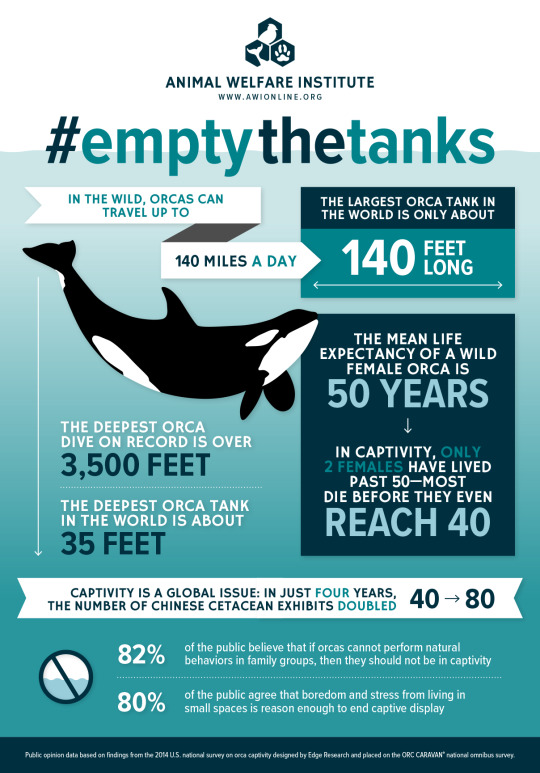

Happy Empty the Tanks Day! There’s no beauty in stolen freedom🐬
Image credit: Empty the Tanks, Animal Welfare Institute, and Oceanic Preservation Society
#katherine speaks#animal welfare#cetaceans#cetacean#orcas#orca#killer whales#killer whale#seaworld#aquarium#aquariums#cetacean welfare#cetacean captivity#orca captivity#dolphin#dolphins#bottlenose dolphin#bottlenose dolphins#beluga#belugas#beluga whale#beluga whales#pilot whale#pilot whales#zoology
48 notes
·
View notes
Text



#90's movies#jason james richter#captivity#family movies#warner bros#killer whales#killer whale#whales#whale#aquatic#oceans#marine mammals#90s kid#90s#90s nostalgia#1990s#movies#movie review#movie recommendation#michael madsen#adventure movies#free willy#whale movie#orca#orca whale#90's#classic movies#marine life#marine animals#sea creatures
18 notes
·
View notes
Text
youtube
It looks like they've introduced live fish into the SeaWorld San Diego orca habitat for enrichment! This is so awesome to see and fantastic for the public to watch as well! It also means the orcas will be getting a lot more exercise and enrichment outside of sessions, which is great!
I'm hoping this continues and is rolled out at the other parks as well - it also depends on how the other orcas would respond. Anecdotally I have heard Katina gets a bit spooked by live fish.
It'll also be interesting to see if the orcas can do sessions in that pool and not get distracted or annoyed by the fish... that happened a lot with the dolphins I worked with in ocean facilities.
#SeaWorld#Blackfish#orca#killer whale#orca captivity#cetacean welfare#watch all the anti caps totally ignore this footage and keep showing their 2 minute video of orcas resting and saying that means they're sa#Youtube
53 notes
·
View notes
Text

Hi,
here I am again, because of a sudden impulse and deep thoughts. The subject of the captivity of orcas has always caused me sad emotions. Recent events in my life have allowed me to see the sad connection and my own symbolism in these animals.
I wanted to draw a sad flipper, but the pose wouldn't let me, and I probably would have made it suck.
I was inspired by Drezzdon's tik tok: https://www.tiktok.com/@drezzdon
Ref photo I used: https://gifts.worldwildlife.org/gift-center/gifts/Species-Adoptions/Orca-Whale
Background text: https://www.nationalgeographic.com/animals/article/orcas-captivity-welfare
Take care of yourselves folks.
6 notes
·
View notes
Text

Frowny eyepatch =/= depression
#this is morgan btw#you know… would be dead if not in captivity because she stranded as a 1 year old#in this particular incident she was having a dispute with kohana#and slid herself off the slide-out of her own free will#also sometimes they just… enjoy sliding out#getting a look at the above world#orcas#killer whales#animal behavior#loro parque#this isn’t an invitation to debate lp please#I’m just pointing out the media’s sensationalization of orca behavior
10 notes
·
View notes
Text
As much as her passing hurts, I believe she's back home. We can't see her, she's not physically there but I believe her spirit is finally home where she belongs with her family and swimming free. She's finally home, just not in a way we wanted, but she's free and her spirit and legacy will live on.
Edit made of Toki and her mother L25 Ocean Sun who is still alive and swimming free in the ocean

#killer whales#killer whale#orcas#southern resident orcas#empty the tanks#captivity kills#toki#Lolita#tokitae#orca edit#my edit#we will never forget you#youll be in our hearts#we love you toki#swim free in the sky
17 notes
·
View notes
Text
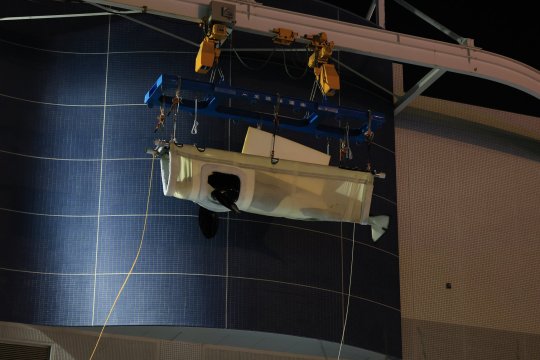
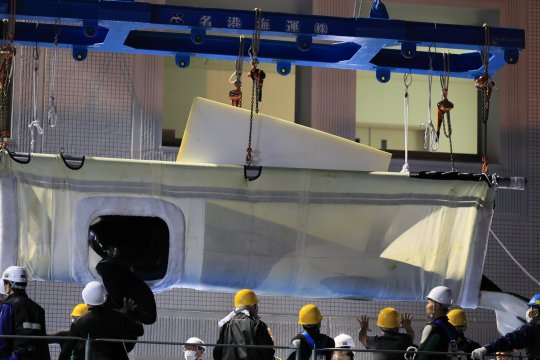
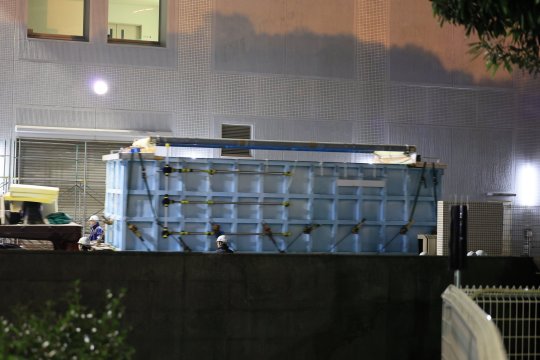
Yesterday Stella was transferred from Port of Nagoya to Kobe Suma. She was separated from her calf Lynn and grandson Earth who remain at Nagoya. She is currently alone at Kobe, but it is believed that at least one whale from Kamogawa will join here in the coming days.
Kobe will be opening on May 30th.
7 notes
·
View notes
Text
Please remember that you’ll be hard pressed to find a pro-cap who thinks it was okay to capture healthy baby orcas to begin with. Like. Seriously. Guys.
#‘you killed orcas when you stole their children from the wild’#oh wow I did???#that was 45 years before I was born but ok#my notifs have been an interesting place this afternoon#orcas#killer whales#pro cap#pro captivity
28 notes
·
View notes
Text
#ocean#sea#cetacean#marine life#animal#orca#orca whale#killer whale#whale#stop captivity#anti captivity#They don't belong in Tanks#Sad
8 notes
·
View notes
Text
the thing i fear pro-caps will never understand is that no matter how luxurious a captive cetacean’s surroundings are, it’s still fundamentally wrong to hold them in captivity due to their socioemotional capacities and their clear sense of self. one could argue that no animal should be forced to meet an arbitrary human-made definition of “personhood” in order to qualify for liberty, and i would agree with that. however, in order to start the massive task of bringing about a paradigm shift in the way the general human public views nonhuman animals (from “something” to “someone” and worthy of equal consideration instead of being legally considered underlings), we should start by achieving that shift for nonhuman animals that are charismatic and that humans easily relate to before tackling the more difficult task of enacting that shift for animals that we’ve been taught all our lives to view solely as curiosities, pests, or sources of food. no matter if a cetacean is being held in a cramped solitary confinement pool barely bigger than their body, a spacious lagoon with plenty of conspecifics and enrichment, or somewhere in between, their status as a captive is still inherently immoral. that’s not to say that all captive situations are the same; the cetaceans in the lagoon are definitely happier than the lonesome one in the tiny pool. rather, i’m saying that even the best possible captive situation is still wrong, so perpetuating the institution of cetacean captivity is also wrong. most captive cetaceans probably can’t be released, but we must try to prioritize their autonomy and make their lives as similar to the wild as possible. i find it deeply ironic that pro-caps claim to love these animals on a deep level that can only be achieved by interacting with them in confinement rather than observing them in their natural habitats, but their love consists of denying them everything that’s important to them. pro-caps refuse to acknowledge their personhood, eagerly attempt to “debunk” cetacean intelligence studies, and support the violation of cetaceans’ freedom of choice through capture, artificial insemination, transfers between facilities, et cetera.
#if you’re interested i highly recommend reading Voices in the Ocean by Susan Casey and In Defense of Dolphins by Dr. Thomas I. White#animal rights#katherine speaks#cetacean#orca#killer whales#orcas#killer whale#dolphin#dolphins#bottlenose dolphin#bottlenose dolphins#beluga#belugas#beluga whale#beluga whales#animal welfare#cetacean welfare#cetacean captivity#dolphin captivity#orca captivity#zoology#cetaceans#vegan
12 notes
·
View notes
Text
I, an uneducated idiot, am going to give my opinion in cetacean captivity, specifically regarding orcas. Specifically specifically regarding SeaWorld.
It's bad that it happened. It's bad that it ever happened in the first place, and when I get to hell I am going to hunt Ted Griffiths for sport for getting the whole thing off the ground.
(more under the cut because this is getting long)
I don't like the commercialisation of SeaWorld. Surely they can study the orcas without making them do tricks for large audiences.
"But Lauren, they stopped doing that!"
Yes, because the public outcry made them stop. They are a for profit company. They did not stop any of this on their own. They did not stop capturing orcas because they felt bad or realized it was wrong. They did not stop breeding orcas because they felt bad or realized it was wrong. I am not anti-zoo, or anti-conservstion. I am strongly anti-capitalist though, and I think SeaWorld as an amusement park needs a whole lot of side eye.
"So Lauren, you think the orcas should go back in the ocean, right?"
Honestly, I don't know. I am just an uneducated idiot, and I wouldn't presume to tell people what to do about it when they might know more than me. Also, historically, I'm going to be honest that it doesn't work well. We did Keiko dirty.
In a perfect world, I would call for wildlife rehabilitation facilities; huge, enormous ones, where all the whales that are family (really, truly family, so mothers would be reunited with their children first and foremost and then we go from there) in captivity could be reunited in sea pools, near enough where wild orcas (of their specific grouping/language) can call to them and they can call back while humans teach them the skills they need to survive in the wild, then release them. This scenario also relies on thriving fish/mammal stocks, which uh. Hmm. An issue for another time, but like I said, this is my idea for a Perfect World. In a perfect world, the other pods would snap up their old and new members easily. We know from Keiko that it is not entirely likely to happen. I also wonder if the captive orcas have their own kind of language borne from different pods being forced together, or at the very least if the younger ones do. The pods of their grandparents might be confused by them, at the very least!
"Lauren, that's not a solution. That's a pipe dream."
Yeah. Kind of. Honestly, it doesn't seem like there's any way to right a lot of these wrongs. It seems that it's a damned if you do, damned if you don't kind of thing; we don't want the whales left in stagnant pools of glass and concrete; if nothing else, they don't have the room they're used to as migratory animals, and they don't have the ecosystem to interact with. We can't release them, they don't know how to be a wild animal anymore. And we aren't kind enough to the natural world to let them figure it out as they go along because they have lost the time they would have otherwise spent learning those skills.
"But Lauren, we know so much more about them now!"
I mean, I guess? Like I said, I am suspicious of the conservation efforts of teaching them tricks for our amusement, and how the captive breeding program that SeaWorld was running seemed to be more for SeaWorld's benefit than for bringing more orcas into our seas. I also don't know how much we can learn if the variable of captivity is there. Does this orca prefer fish because it was from a resident pod, or because they were primarily fed fish by their humans? If they were originally from a transient pod, was the transition to a fish-based diet difficult for them? Would it be difficult to go back? It seems so individual that we cannot possibly know.
BUT I acknowledge your point. Would we have cared to learn as much about them if we didn't have this experience? This capitalist push behind them? I don't think we actually would have. Look at sharks. They have less than 150 marine biologists dedicated to them right now, counting post grad students if I remember that YouTube video essay correctly. We wouldn't know to love orcas if we hadn't done this; hell, they might have been treated like the Great White Shark! It's good that we love orcas and we care about them! It means that we might make better efforts regarding the Chinook Salmon that the Southern Pacific Resident pod thrives on, or reducing pollution, or any number of things. I can't say what knowledge we have lost or gained because of specific actions. Again, it seems so variable that I cannot say. How many marine biologists today were taken to SeaWorld as a child? That seems quantifiable, but how many people didn't go into marine biology as adults because their experience wasn't as good; the weather was bad, their parents fought, the whales weren't performing as well as they did some other day? That the experience was coloured in some way in their perception, pushing them from the field? That's less quantifiable.
So that's my opinion on it. It's not good, and quite honestly it shouldn't have come this far in the first place. But there's really not much we can do about it now, except maybe letting them die with their loved ones.
#cetacean captivity#controversy#orcas#killer whales#discourse#look im really not trying to start anything im just giving my opinion
2 notes
·
View notes
Text

#job 42:10#killer whales#captivity#the lord#beavis and butthead#daily bread#nightly bread#god is love
2 notes
·
View notes
Text
Release of Lolita, Captive Killer Whale, to Wildlife Sanctuary Marks a Significant Step Towards Marine Life Conservation
Wildlife Sanctuary Marks a Significant Step Towards Marine Life Conservation Lolita, a captive killer whale weighing 2,268kg, is set to be released into the ocean after spending over 50 years in captivity at a Florida aquarium. The decision comes following a deal reached between the aquarium and animal welfare advocates, including the nonprofit organization Friends of Lolita. The release plan…
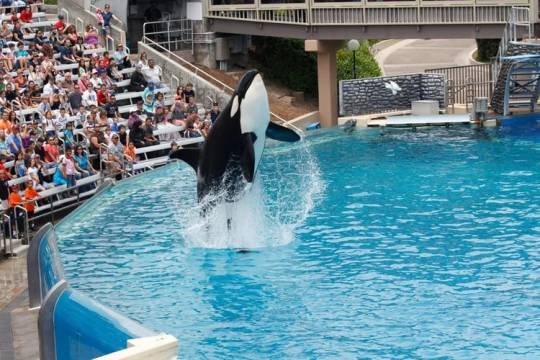
View On WordPress
#animal captivity issues#animal rights organizations#animal welfare groups#captive killer whales#killer whale rehabilitation#marine animal welfare#marine life conservation#marine mammal rehabilitation#wildlife sanctuaries
2 notes
·
View notes